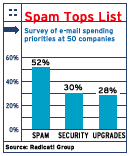Microsoft Takes Spam Battle To Courts With 15 Civil Lawsuits
In cooperation with the Washington State Attorney General's office and law enforcement officials in London, Microsoft last week filed 15 civil lawsuits in the United States and the United Kingdom designed to financially crush spammers who allegedly sent 2 billion illegal e-mails to Microsoft Hotmail and MSN customers.
In a press conference last week, Microsoft Senior Vice President and General Counsel Brad Smith said the company filed 12 civil cases in Washington state, one in California and two in the United Kingdom based on Washington's strong antispam law.

"Spam is a growing problem," Smith said. "It's a global problem and requires a global solution. We are ramping up our efforts to combat it around the world."
Smith advised other ISPs to take spammers to court using the antispam laws now in effect in 27 states. He said Microsoft will exploit the relationships it already has with law-enforcement agencies worldwide involved in nabbing software pirates and those who distribute counterfeit Office and Windows software.
Echoing Microsoft's tough stance, Washington State Attorney General Christine Gregoire said she is most concerned about deceptive, pornographic spam being sent to consumers.
Spam costs businesses $9 billion per year and "threatens the credibility of legitimate e-commerce," she said.
"It's obvious our 'delete' key won't solve this problem," Gregoire said at the press conference. "These lawsuits are the kinds of actions we need to put illegal spammers out of business. We need to make life tough on spammers."
Solution providers applauded legal efforts to combat spam but said the battle will require a combination of technology solutions, vendor partnerships, legislation and enforcement to solve the problem.
"I am glad Microsoft is striking a blow against spammers," said Ken Winell, CEO of Econium, Totowa, N.J.
Anthony Harbour, president and CEO of Harbour and Associates, Richmond, Va., said he didn't expect the antispam law in his state to have much of an effect in fighting spam, since most spammers use bogus source e-mail addresses, which makes them hard to track down.
"Still, it is an effort in the right direction [for] fighting Spam," Harbour said.